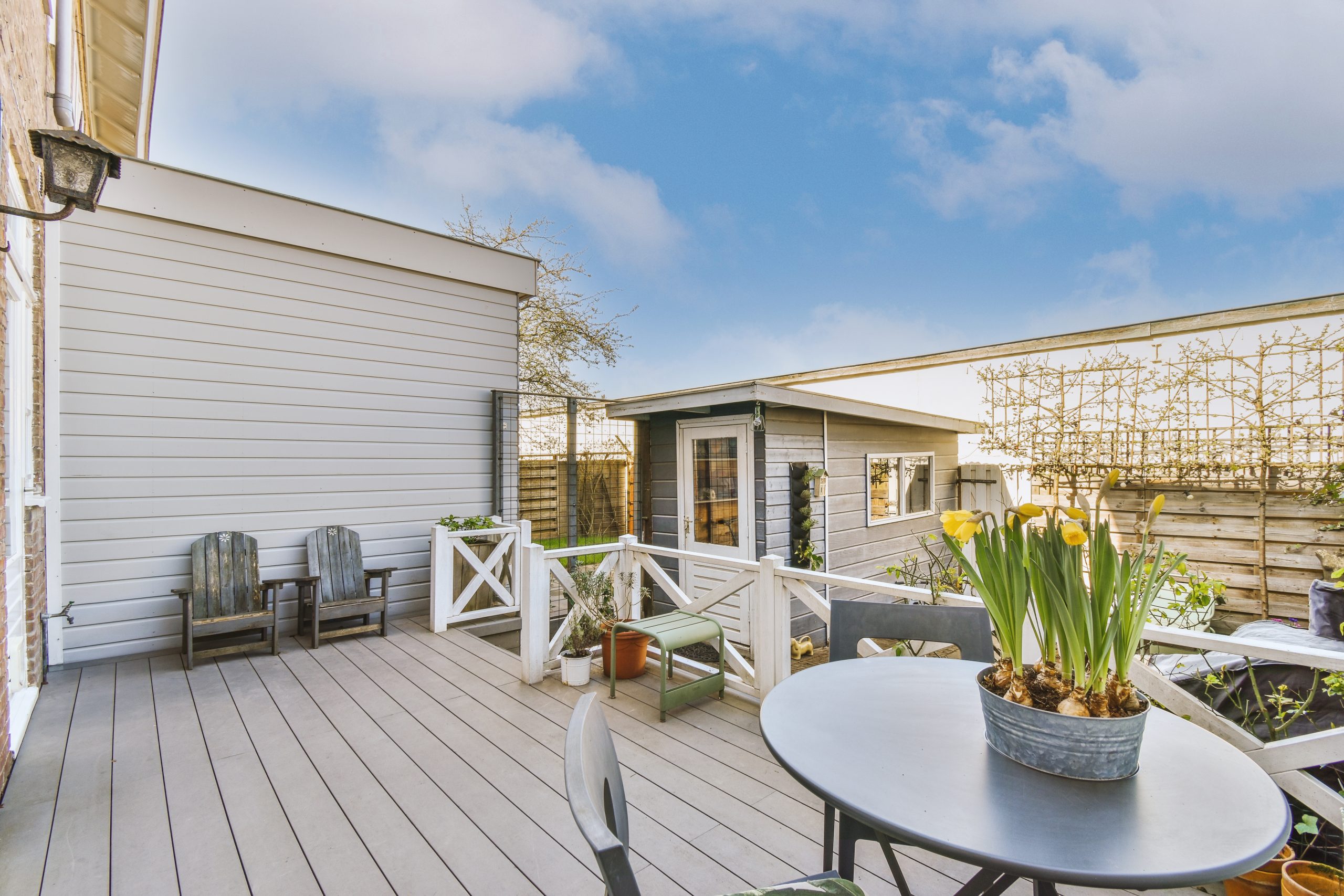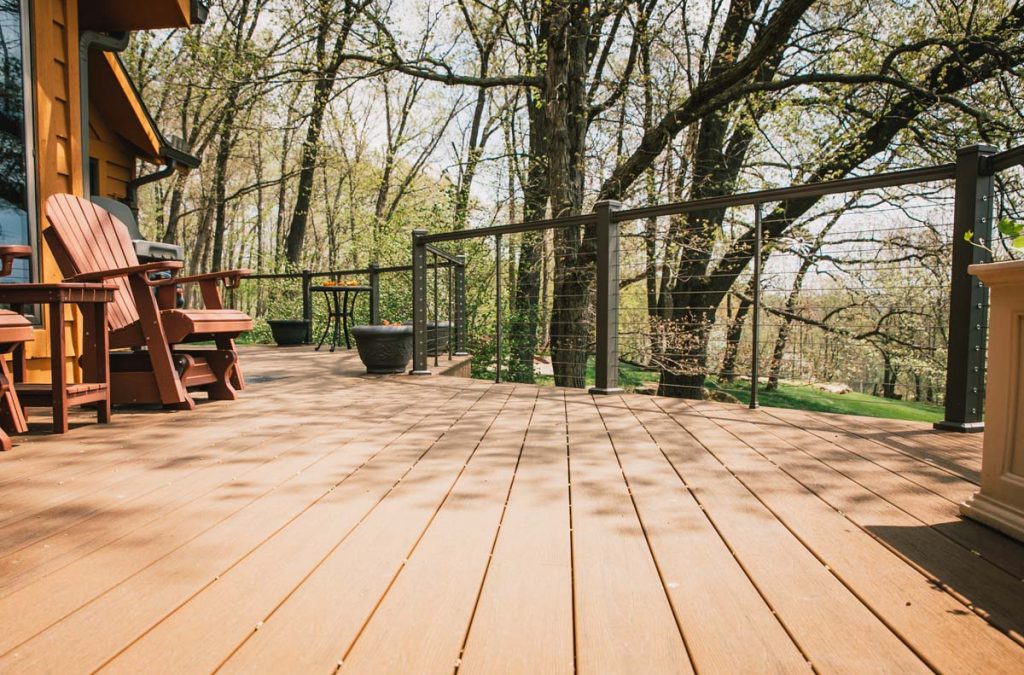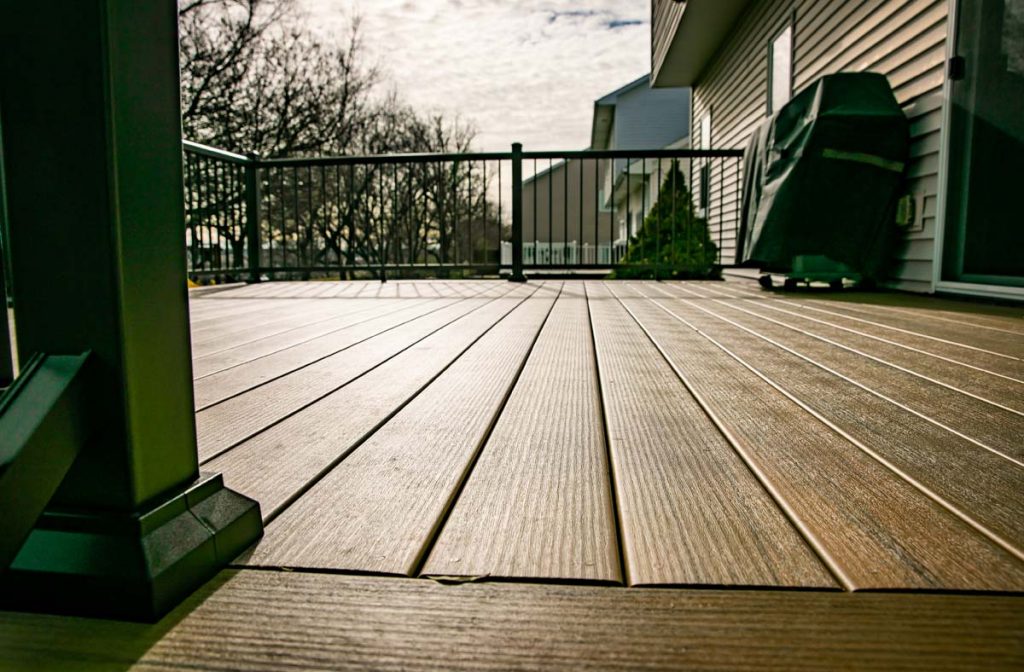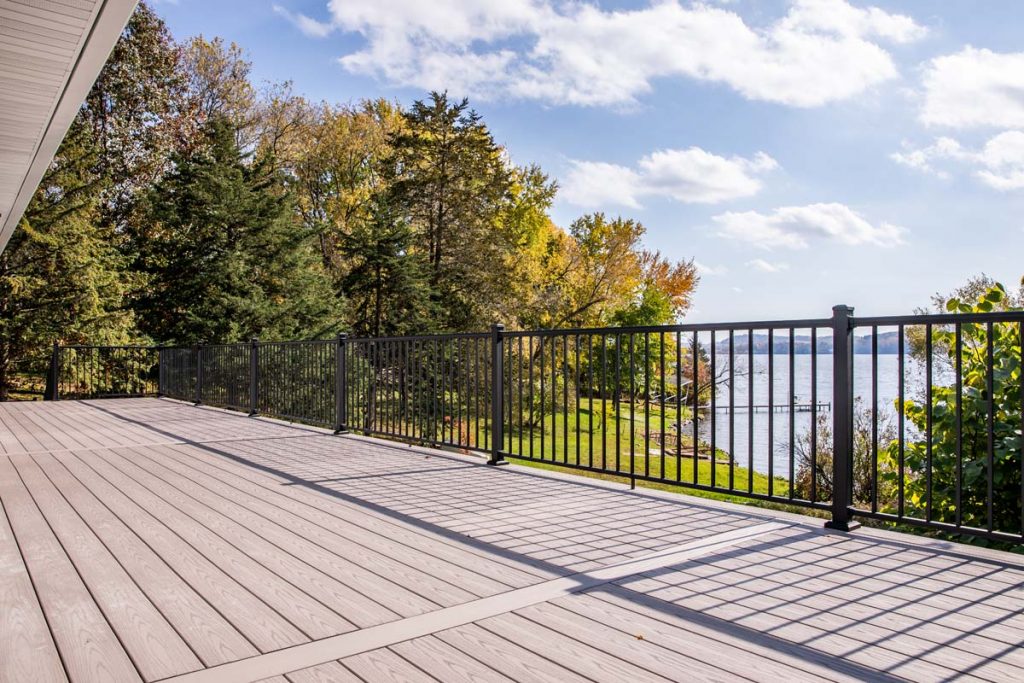
When it comes to a PVC vs composite decking comparison, many homeowners wonder which is the better option for their outdoor space. With so many decking options available today, choosing the right deck material involves more than just looks. From advanced PVC to eco-friendly composites that mimic natural wood, modern decking offers a variety of benefits and drawbacks.
Whether you’re planning a new deck or replacing a traditional wood deck, knowing how each performs in terms of durability, maintenance costs, and appearance is key. Let’s explore how these popular building materials compare, without jumping to conclusions too quickly.
What is the difference between composite and PVC decking?
The main difference between PVC and composite decking is the material makeup. PVC decking is made entirely from plastic, while composite decking blends recycled plastic with wood fibers. This core difference affects how each performs, feels underfoot, and responds to moisture, temperature, and long-term wear.
PVC decking resists moisture better than composite and doesn’t contain any organic material that could promote mold or rot. That makes it ideal for wet or coastal climates. It’s also typically lighter, which can simplify installation. However, it may look less like natural wood and can feel hotter in direct sunlight.
Composite decking, on the other hand, offers a more realistic wood appearance thanks to its wood-fiber content. It’s often the better choice for homeowners who want that traditional wood deck look with less upkeep. While it holds up well in many environments, it may be more prone to moisture-related swelling or fading over time if uncapped.
Planning to install new decking or refresh your exterior with a clean coat of paint? Our Wisconsin-based team is ready to help bring your home’s look to life.
PVC vs composite decking comparison chart
If you’re comparing decking options for a new outdoor living area, this PVC vs composite decking comparison chart can help you weigh your choices side by side. While both materials offer a low-maintenance, durable, and long-lasting alternative to traditional wood, they perform differently depending on your priorities.
From how they handle temperature changes to how closely they resemble natural wood, knowing the pros and cons of each is key to choosing the right deck material for all types of decks.
HIGH-QUALITY
ROOF REPLACEMENT
YOU CAN RELY ON
Choose Prairie Exteriors for durable, dependable asphalt roofing solutions designed to stand the test of time.
| Comparison Point | PVC Decking | Composite Decking | Winner |
| Cost | Higher upfront cost, especially for advanced PVC decking | More cost-effective for most budgets | Composite |
| Durability and Longevity | Extremely resistant to moisture, mold, and rot; lasts 30–50 years | Durable but may absorb moisture over time; lifespan of 25–40 years | PVC |
| Maintenance | Low-maintenance; never needs sealing, staining, or painting | Requires periodic cleaning and may need occasional sealing | PVC |
| Resale Value | Good resale value, especially on newer homes in wet climates | Slightly higher resale appeal due to natural wood aesthetics | Composite |
| Heat Resistance | Tends to get hotter in direct sun; can be uncomfortable to walk on | Stays cooler and more comfortable underfoot | Composite |
| Texture and Feel (Look Like Wood) | Smooth and uniform; some styles mimic wood grain but may feel synthetic | Offers a more realistic wood grain and natural wood look | Composite |
| Wet Climate Performance | Highly water-resistant and ideal for damp areas or near pools/lakes | Performs well but can expand and contract in humid weather | PVC |
| Ease of Installation | Lightweight but may expand/contract more, needing gaps and precise spacing | Heavier than PVC but easier to work with for deck builders | Composite |
| Sustainability | Made from plastic, some recycled, but less eco-friendly overall | Made from recycled materials, a better environmental choice | Composite |
| Style and Color Variety | Limited color palette, but great for modern styles | Available in a wide range of colors and wood textures | Composite |
| Warranty Life | Often backed by 50-year or even lifetime warranties | Typically 25–30 years; shorter than PVC in many cases | PVC |
| Overall Winner | Great for long-term durability, water resistance, and no-fuss upkeep | Best choice for realistic wood aesthetics, cost, and eco-friendly appeal | Composite (slightly) |
Composite vs PVC decking: A deeper look
Composite and PVC are two of the most popular choices for a low-maintenance, long-lasting deck. But which type of decking is better?
Below is a full breakdown of the major differences between composite and PVC decking, organized by what matters most when choosing your decking. Use this side-by-side to find the best fit for your outdoor living area.

1. Composite vs PVC decking cost
The PVC decking vs composite price comes down to material and brand. On average, composite is slightly cheaper, especially at the entry level. Premium lines can match PVC in cost, but uncapped decking is more budget-friendly. PVC carries a higher upfront cost, often offset by longer warranties.
Winner: Composite
It generally offers more budget options and gives homeowners a cost-effective solution for new deck builds.
2. PVC vs composite decking durability and longevity
Both options are resistant to rot, insects, and moisture. However, PVC decking is made entirely from plastic, making it more resistant to mold, stains, and swelling. Composite decking contains wood fibers inside, so it may eventually absorb moisture.
Winner: PVC
Its all-plastic construction makes it more resistant to long-term weather and moisture exposure.

3. PVC decking vs composite maintenance
Neither option requires staining or sealing like wood. But PVC decking typically needs less maintenance over time. Composite boards may need occasional mold cleaning or refinishing if uncapped.
Winner: PVC
It’s a low-maintenance option that resists buildup and stays clean with occasional rinsing.
4. PVC or composite decking for resale value
High-end composite brands like TimberTech decking tend to carry strong resale value due to their wood-like appearance and long warranties. PVC options also hold value, especially AZEK decking, but may look less realistic.
Winner: Composite
Composite decking offers a better wood look, which many buyers prefer for aesthetics and resale.

5. Composite decking vs PVC heat resistance
Dark colors of both materials can get hot underfoot, but PVC often retains more heat and can become uncomfortable in direct sunlight. Composite boards, especially lighter colors or capped styles, tend to handle heat better.
Winner: Composite
It stays cooler underfoot in the summer, making it a better choice for barefoot traffic.
6. PVC deck boards vs composite texture
Composite decking performs well in terms of realism. It offers a natural wood look, with grain textures that feel authentic. PVC can mimic wood, but sometimes feels more plastic-like.
Winner: Composite
The look and feel of wood is more convincing in most composite lines.

7. Composite or PVC decking in wet climates?
PVC is highly resistant to water and doesn’t absorb moisture, making it ideal for humid or rainy environments. Composite does well, but it can expand and contract more due to water absorption if uncapped.
Winner: PVC
PVC decking is made for wet climates and offers a durable, water-resistant solution.
8. Installing composite decking vs PVC
Both install similarly using fasteners or clips, but PVC is lighter and easier to maneuver. Composite can be heavier than PVC and may require more structural support in some cases.
Winner: PVC
Its lighter weight makes it easier for deck builders or homeowners themselves to install efficiently.

9. Composite or PVC decking for sustainability?
Composite decking is often made from recycled materials like wood products and plastics. PVC is made from virgin or partially recycled plastic and is less eco-friendly overall.
Winner: Composite
If you’re choosing the right material for sustainability, composite wins for using more recycled content.
10. Composite decking or PVC for variety?
Both decking options come in a wide range of colors and wood tones, but composite typically offers more grain patterns and options that replicate traditional wood decks.
Winner: Composite
More variety in wood grain and natural look finishes means better visual customization.
11. Composite decking vs PVC decking warranty life
Warranties vary by brand, but PVC warranties often last longer, some over 50 years. Composite warranties typically fall in the 25–40 year range, depending on product line and brand.
Winner: PVC
Longer warranty life makes PVC a better choice for long-term peace of mind.

Is PVC decking better than composite? Our key takeaways
So, which is better, PVC or composite decking? It depends on what you want most in your deck. PVC is better for wet climates, low maintenance, and longevity. Composite is often the better choice if you want a natural wood look, eco-friendly materials, or a wider range of color and texture options. If you’re building a deck for high-moisture areas or want the longest warranty, PVC may win.
If you’re after cost savings, resale value, and realism, composite often comes out ahead. Choose based on your climate, budget, and style preferences.
Ready to upgrade your outdoor living space? Contact us today for a free consultation, and let our expert deck builders in Dane County help you choose the perfect PVC or composite decking for your home.
Can’t decide between PVC or composite decking?
Still weighing the pros and cons of each option? We get it—choosing the right material for your outdoor space can be tough. We can help you decide between great brands like TimberTech composite vs PVC and guide you toward the best fit for your home, climate, and budget.
If you’re in Dane County, our team of experienced deck builders Madison WI is ready to assist with personalized recommendations, product selection, and full installation services.
UPGRADE YOUR ROOF WITH CONFIDENCE
Protect your home with durable, high-quality roofing from Prairie Exteriors. Trusted and reliable solutions.
Explore our local decking pages below and get in touch to start planning your new deck:
- Baraboo
- Deforest
- Fitchburg
- Lodi
- Madison
- Middleton
- Portage
- Poynette
- Prairie Du Sac
- Reedsburg
- Sauk City
- Stoughton
- Sun Prairie
- Verona
- Waunakee
HIGH-QUALITY
ROOF REPLACEMENT
YOU CAN RELY ON
Choose Prairie Exteriors for durable, dependable asphalt roofing solutions designed to stand the test of time.
FAQs
Is PVC a composite material?
No, PVC is not a composite material. It’s made entirely from polyvinyl chloride, a single synthetic plastic. Unlike composite decking, which combines wood fibers with plastic polymers, PVC contains no wood or reinforcing materials. It’s classified as a pure plastic product, not a hybrid or engineered blend.Composite decking earns its name by combining different materials—typically recycled plastic and wood fibers—to enhance durability and reduce maintenance.
PVC, however, is a uniform plastic material. It’s often used in high-performance decking for its water resistance and low upkeep, but it lacks the blended structure that defines a true composite. Therefore, there is no such thing as composite PVC — the term is technically inaccurate.
So, what is PVC composite?
“PVC composite” is not a formal material category. It’s a vague or marketing-driven term that usually refers to either 100% PVC decking or capped composite decking with a PVC outer shell. The label can be misleading, so it’s important to verify the actual material composition.In most cases, what’s called “PVC composite” is either:
- A fully plastic PVC board (no wood)
- Or a composite core wrapped in a PVC cap (a true composite)
Because of this ambiguity, the term shouldn’t be treated as a distinct product type. Always check the manufacturer’s specifications to understand what you’re getting.


